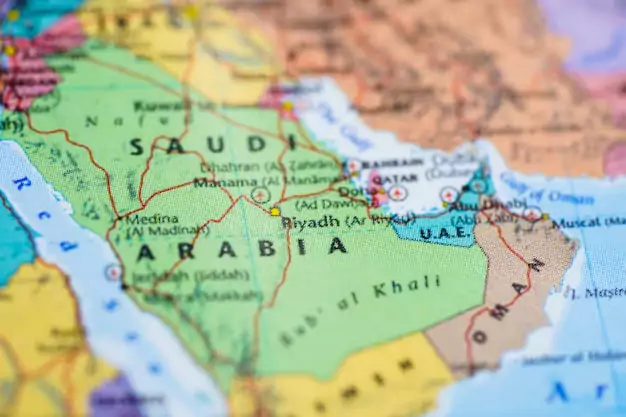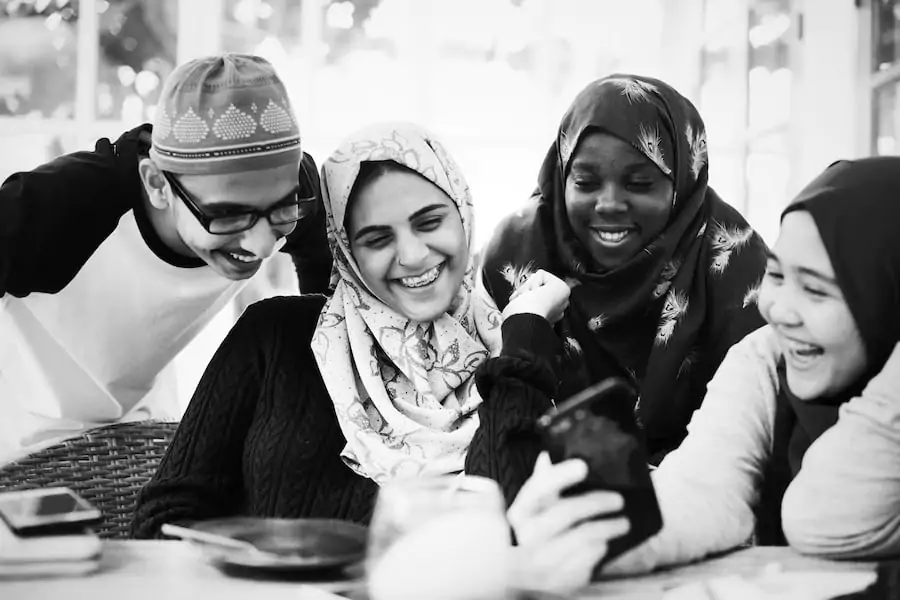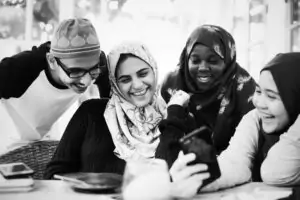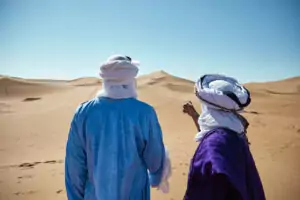Arabic is a beautiful and rich language with numerous ways to express gratitude and say “thank you.” From Modern Standard Arabic (MSA) to various regional dialects, learning these phrases will help you build rapport and leave a lasting impression on Arabic-speaking communities. In this article, we’ll explore the common ways to convey appreciation in Arabic, providing pronunciation, definitions, and usage examples for each expression.

✅ AI Essay Writer ✅ AI Detector ✅ Plagchecker ✅ Paraphraser
✅ Summarizer ✅ Citation Generator
Expressing Gratitude in Modern Standard Arabic
One way to say “thank you” in Modern Standard Arabic is “Hukran” (شكراً). This simple phrase is used in both formal and informal settings to express gratitude for any act of kindness or assistance. For example, you can say “Hukran” when someone holds the door for you or helps you with your bags.
Hukran (شكراً)
- Pronounced: huk-ran
- Definition: A simple and common way to say “thank you” in Modern Standard Arabic, used in both formal and informal settings to express gratitude for any act of kindness or assistance.
- Usage: You can say “Hukran” when someone holds the door for you or helps you with your bags.
In response to “Hukran,” you can use “Al-‘awfoo” (العفو) or “‘af-waan” (عفواً), both of which mean “you’re welcome” and are polite responses to someone expressing gratitude. If someone thanks you for a favor, responding with “Al-‘awfoo” shows your willingness to help.
Al-‘awfoo (العفو)
- Definition: Polite responses to someone expressing gratitude, meaning “you’re welcome” and showing your willingness to help.
- Usage: When someone thanks you for a favor, responding with “Al-‘awfoo” shows your kindness and appreciation.
Another formal expression to show respect and gratitude is “Ashkuraka” (أَشْكُرُك), which, much like understanding the meaning of obrigado in English, helps in expressing thanks. This phrase is particularly used when speaking to colleagues or elders. For instance, if someone provides you with valuable advice, you can express your gratitude by saying “Ashkuraka for your guidance,” just as you would say “obrigado” in Portuguese-speaking contexts to show appreciation.
Ashkuraka (أَشْكُرُك)
- Pronounced: ash-ku-ra-ka
- Definition: A formal expression to show respect and gratitude, often used when speaking to colleagues or elders.
- Usage: Use “Ashkuraka” to express your gratitude when someone provides valuable advice or assistance.
In response to “Ashkuraka,” you can use “Ahlan wa sahlan” (أهلا و سهلا), which means “welcome.” This friendly reply makes the person feel at ease and appreciated.
Ahlan wa sahlan (أهلا و سهلا)
- Definition: A friendly response meaning “welcome,” making the person feel at ease and appreciated.
- Usage: Use this reply to show your appreciation for their thanks.
A kind way to say “thank you” and wish someone well is by using “Yekather Khairak/Ek” (يكثر خيرك). This expression is suitable for conveying profound thanks after receiving a favor. For example, you can say “Yekather Khairak for your generosity” to show your gratitude.
Yekather Khairak/Ek (يكثر خيرك)
- Pronounced: ye-ka-ther khai-rak / ek
- Definition: A kind way to say “thank you” and wish someone well, suitable for conveying profound thanks after receiving a favor.
- Usage: Say “Yekather Khairak” to show your deep gratitude for someone’s generous act.
In response to this, a thoughtful reply is “Wa Antum fa Jazakumullahu Khayran” (وأنتم فجزاكم الله خيرًا), which means “and you too, May Allah reward with Goodness.” This reciprocates the sentiment and extends blessings back to the person.
Wa Antum fa Jazakumullahu Khayran (وأنتم فجزاكم الله خيرًا)
- Definition: A thoughtful reply, meaning “and you too, May Allah reward with Goodness,” reciprocating the sentiment and extending blessings back to the person.
- Usage: Use this response to express your thanks and invoke blessings on the person.
Another common expression used among Muslims in all Arab-speaking countries is “Baraka Allahou Feek” (بارك اللَّه فيك). This expression shows gratitude and wishes blessings on the person. You can use it when someone does something exceptionally kind for you.
Baraka Allahou Feek (بارك اللَّه فيك)
- Pronounced: ba-ra-ka al-la-hou feek
- Definition: A common expression among Muslims in all Arab-speaking countries, showing gratitude and wishing blessings on the person.
- Usage: Use “Baraka Allahou Feek” when someone does something exceptionally kind for you.
In response to “Baraka Allahou Feek,” a polite reply is “Jazakallah Khiran” (جزاك الله خير), which means “May God reward you with good.” This expresses thanks and invokes blessings on the person.
Jazakallah Khiran (جزاك الله خير)
- Definition: A polite reply, meaning “May God reward you with good,” expressing thanks and invoking blessings on the person.
- Usage: Use this response to acknowledge the thanks and show your appreciation.
Expressing Gratitude in Other Arabic Dialects

In Syria and Lebanon, a way to say “thank you very much” is by using “Shoukran Ktir” (شُكْراً كْتير). This expression is suitable for conveying extreme gratitude in both formal and informal settings. For example, when someone goes above and beyond to help you, you can say “Shoukran Ktir” to express your deep appreciation.
Shoukran Ktir (شُكْراً كْتير)
- Pronounced: shouk-ran k-teer
- Definition: A way to say “thank you very much” in Syria and Lebanon, suitable for conveying extreme gratitude in both formal and informal settings.
- Usage: Say “Shoukran Ktir” when someone goes above and beyond to help you.
A polite response to “Shoukran Ktir” is “Ahlan wa sahlan” (أَهْلًا وَسَهْلًا), which means “welcome.” This friendly and polite reply makes the person feel comfortable and appreciated.
Ahlan wa sahlan (أَهْلًا وَسَهْلًا)
- Definition: A friendly and polite response meaning “welcome,” making the person feel comfortable and appreciated.
- Usage: Use this reply to show your appreciation and make them feel welcome.
In Lebanon and Syria, a polite way to say “I’m thanking you” is by using “Betshakkarak/Ek” (بِاتْشَكَّرِك / بِاتْشَكَّرَك). Use “betshakkarak” when addressing men and “betshakkarek” when speaking to women. For example, when someone helps you, you can say “Betshakkarak” or “Betshakkarek” to show your gratitude.
Betshakkarak/Ek (بِاتْشَكَّرِك / بِاتْشَكَّرَك)
- Pronounced: bet-shak-ka-rak / ek
- Definition: A polite and straightforward way to say “I’m thanking you,” used in Lebanon and Syria.
- Usage: Use “Betshakkarak” when addressing men and “Betshakkarek” when speaking to women to show your gratitude for their help.
A casual response to this is “Wala yhemmak” (ولا يهمك), which means “don’t worry about it.” This casual reply is suitable for downplaying the effort when someone thanks you for a small favor.
Wala yhemmak (ولا يهمك)
- Definition: A casual response meaning “don’t worry about it,” suitable for downplaying the effort when someone thanks you for a small favor.
- Usage: Use this reply to show that you’re happy to help and that it was not a burden.
In Syria, a formal expression to tell someone “I’m grateful for you” is “Mumtanon Lak/Mumtanaton Laka” (مُمْتَنةٌ لك / مُمْتَن لك). Use “mumtanon lak” when addressing men and “mumtanaton laka” when speaking to women. This expression is used in professional or business settings. For example, you can use it when addressing colleagues or clients.
Mumtanon Lak/Mumtanaton Laka (مُمْتَنةٌ لك / مُمْتَن لك)
- Pronounced: mum-ta-non lak / mum-ta-na-ton la-ka
- Definition: A formal expression used to tell someone “I’m grateful for you,” often used in professional or business settings.
- Usage: Use “Mumtanon Lak” when addressing men and “Mumtanaton Laka” when speaking to women.
A polite response to this is “Ala Ar-Ruhbi wa As-Sa’a” (على الرحب والسّعة), which means “you’re welcome.” This courteous reply acknowledges the thanks graciously.
Ala Ar-Ruhbi wa As-Sa’a (على الرحب والسّعة)
- Definition: A courteous response meaning “you’re welcome,” acknowledging the thanks graciously.
- Usage: Use this reply to show your appreciation for their gratitude.
Other Thankful Expressions in Arabic

Another way to express gratitude is by using “Tislam/Tislami” (تسلم/ تسلمي), which means “be well.” This expression is used to bless someone who has given you a gift or performed a favor. For example, if someone offers you a delicious meal, you can say “Tislam” or “Tislami” to appreciate their gesture.
Tislam/Tislami (تسلم/ تسلمي)
- Pronounced: tis-lam / tis-la-mi
- Definition: An expression used to bless someone who has given you a gift or performed a favor, meaning “be well.”
- Usage: Say “Tislam” or “Tislami” to appreciate someone’s gesture, such as offering you a delicious meal.
To bless the giver, you can add “Ideyk” (إيديك) for a male or “Ideyki” (إيديكي) for a female to “Tislam/Tislami.” This changes the expression to “may your hands enjoy health.”
Ideyk” (إيديك)/Ideyki (إيديكي)
- Definition: Adding “Ideyk” or “Ideyki” to “Tislam/Tislami” blesses the giver with the wish for healthy hands.
- Usage: When receiving a thoughtful gift, say “Tislam Ideyk” or “Tislami Ideyki” to wish the giver well.
In Syria and Lebanon, a polite and respectful way to thank a service provider, such as a waiter or contractor, is by saying “Yeslamou” (يسلموا), which means “may your hands stay safe.”
Yeslamou (يسلموا)
- Pronounced: yes-lam-ou
- Definition: This phrase means “may your hands stay safe” and is used in Syria and Lebanon when showing politeness and respect to someone providing a service.
- Usage: Say “Yeslamou” to appreciate a waiter’s service at a restaurant or a contractor’s work at your home.
In Syria and Lebanon, you can also express appreciation with “Ea’esht” (عشت), which means “may you live a long life.” This expression is a way to make someone smile and show gratitude for their kind gestures.
Ea’esht (عشت)
- Pronounced: ea-esh-t
- Definition: Used in Syria and Lebanon to express the wish “may you live a long life” as a way to appreciate someone’s kind gesture.
- Usage: Say “Ea’esht” to show your heartfelt appreciation for a friend’s thoughtful act.
In Tunisia, a formal way to wish someone the best in life and show your faith is by using “Yea’yshak” (يِعَيِّشَك), which means “may God give you a long life.” This expression can be used as a special prayer.
Yea’yshak (يِعَيِّشَك)
- Pronounced: ye-a-yi-shak
- Definition: A formal expression spoken in Tunisia, used as a special prayer to wish someone a long and blessed life.
- Usage: Use “Yea’yshak” to show your faith and appreciation for someone’s kindness.
If you’re improving your Modern Standard Arabic skills and your teacher gives wonderful lessons, you can give them a sincere compliment using “Nā etʿallemt ḥāgāt ketīr ʾawī besababak” (أنا اتعلمت حاجات كتير أوي بسببك), which means “I have learned so much thanks to you.” This phrase is also a great way to praise any mentor of yours.
Nā etʿallemt ḥāgāt ketīr ʾawī besababak (أنا اتعلمت حاجات كتير أوي بسببك)
- Pronounced: na et-al-lemet ha-gat ke-teer a-we be-sa-ba-bak
- Definition: This phrase means “I have learned so much thanks to you” and is a sincere compliment to express gratitude for valuable lessons.
- Usage: Say this to praise a teacher or mentor who has had a significant impact on your learning journey.
To express deep appreciation for someone’s support, you can use “Ma Qassart”/”Ma Qassarti” (ما قَصَّرتِي / ما قَصَّرْت), which means “you did the best you could and you didn’t limit your kindness or favor on me.” This poetic expression captures how much effort someone put into supporting you.
Ma Qassart/Ma Qassarti (ما قَصَّرتِي / ما قَصَّرْت):
- Pronounced: ma kas-sart / ma kas-sar-ti
- Definition: A poetic expression in Modern Standard Arabic, meaning “you did the best you could and you didn’t limit your kindness or favor on me.”
- Usage: Use this thoughtful remark to remind someone that their support has been exceptional.
FAQ
How to say “thank you” in formal and informal conversation in Arabic?
In formal conversation, you can say “Shukran” (شكراً) to express gratitude. In informal settings, “Hukran” (شكراً) is commonly used to say “thank you.”
Are there any differences in expressing gratitude when talking to a woman and a man in Arabic?
Yes, there are slight differences. When addressing a woman, you can use “Shukran Lak” (شكراً لك) to say “thank you.” For a man, you would say “Shukran Lak” (شكراً لك) as well.
How can I get better at my Arabic pronunciation?
To improve your Arabic pronunciation, practice speaking with native speakers or use language learning apps that offer audio exercises. Focus on the correct pronunciation of each letter and word, and listen carefully to native speakers to imitate their speech patterns. Regular practice and exposure to the language will help you become more confident in your pronunciation.
Follow us on Reddit for more insights and updates.





Comments (0)
Welcome to A*Help comments!
We’re all about debate and discussion at A*Help.
We value the diverse opinions of users, so you may find points of view that you don’t agree with. And that’s cool. However, there are certain things we’re not OK with: attempts to manipulate our data in any way, for example, or the posting of discriminative, offensive, hateful, or disparaging material.